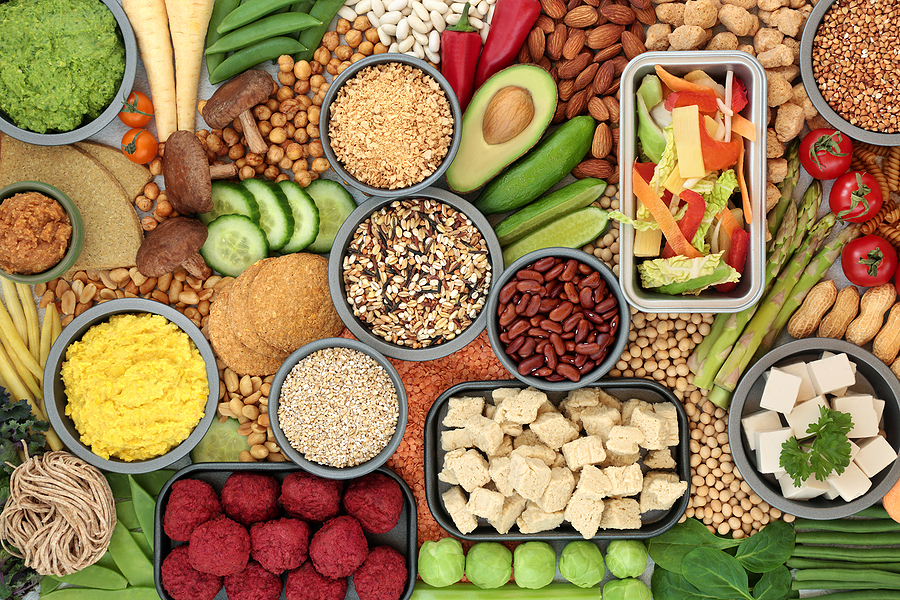Dietitian-Approved Sugar Free Sauces for Clean Eating Success
Wiki Article
All Regarding Healthy And Balanced Food: Benefits of Taking On Plant Based Alternatives
The conversation surrounding plant-based diet plans has acquired considerable attention in recent years. Many people are exploring the potential health benefits, dietary advantages, and ecological impacts related to these nutritional selections. As individuals become much more knowledgeable about their food's impact on well-being and sustainability, concerns occur regarding the practicalities of taking on such a lifestyle. What certain adjustments can one expect, and just how might these options reshape not only individual health but additionally the earth's future?Recognizing Plant-Based Diet Regimens
Although numerous individuals link plant-based diets primarily with vegetarianism or veganism, these diet regimens can encompass a variety of consuming patterns that prioritize entire, minimally processed plant foods. Such diets often include fruits, veggies, whole grains, seeds, beans, and nuts, while removing or limiting animal products. This versatility allows individuals to customize their nutritional selections according to dietary demands and individual preferences. Some may take on a mostly plant-based diet regimen while still sometimes consuming meat or milk, usually referred to as a flexitarian approach. The emphasis remains on including more plant foods, which can result in a varied array of dishes and tastes. Recognizing these different analyses of plant-based consuming is crucial for appreciating its ease of access and charm in modern food society.Wellness Conveniences of Plant-Based Foods
The health benefits of plant-based foods are considerable, supplying a nutrient thickness benefit that sustains general well-being. Research study indicates that these foods can improve heart wellness and play a necessary function in efficient weight monitoring. By incorporating extra plant-based alternatives, people may improve their dietary options and advertise long-lasting wellness.Nutrient Thickness Benefit
Nutrient thickness plays an essential duty in the health benefits of plant-based foods, making them an engaging option for those seeking a balanced diet plan. Plant-based foods, such as fruits, vegetables, beans, nuts, and entire grains, are frequently rich in vital vitamins, minerals, and anti-oxidants while being lower in calories. This high nutrient thickness allows individuals to eat less calories while still meeting their dietary requirements. Additionally, these foods are loaded with dietary fiber, advertising digestion health and assisting in weight administration. By incorporating nutrient-dense plant-based choices, customers can enhance their general wellness, sustain their immune systems, and reduce the danger of chronic diseases. Eventually, the nutrient density of plant-based foods highlights their value in a health-conscious way of life.Heart Health And Wellness Enhancement

Weight Management Support
Along with promoting heart wellness, a plant-based diet plan can significantly aid in weight management. This dietary method highlights whole foods such as fruits, vegetables, beans, nuts, and whole grains, which are generally reduced in calories and greater in fiber compared to animal-based items. The high fiber web content assists increase satiety, reducing total calorie consumption. Additionally, plant-based diet plans are typically rich in vital nutrients while reduced in undesirable fats, making it less complicated to keep a healthy weight. BBQ Sauces. Study suggests that people who take on a plant-based lifestyle tend to have lower body mass indexes (BMIs) and experience even more effective fat burning compared to those that take in meat-heavy diet plans. Subsequently, accepting plant-based alternatives is a tactical choice for effective weight monitoring
Nutritional Worth of Plant-Based Ingredients
Plant-based components are abundant in crucial nutrients, providing a diverse range of vitamins, minerals, and anti-oxidants that add to overall health and wellness. A contrast of healthy protein sources reveals that while animal items are often deemed premium, many plant-based alternatives offer sufficient protein and various other advantageous compounds. Comprehending the dietary worth of these active ingredients can aid individuals make educated nutritional selections.Crucial Nutrients in Plants
Nutrient-rich ingredients located in plants provide a diverse variety of vital minerals and vitamins that contribute considerably to overall health. These ingredients are abundant in vitamins A, C, and K, which sustain immune feature, vision, and blood clot, specifically. Additionally, plants offer crucial minerals such as calcium, magnesium, and potassium, vital for heart health, muscle feature, and bone stamina. The existence of fiber in plant-based foods help digestion and promotes a healthy gut microbiome. Antioxidants, found perfectly in vegetables and fruits, aid combat oxidative anxiety and decrease swelling. Furthermore, lots of plant foods are low in calories yet high in nutrients, making them an excellent choice for those seeking to keep a healthy weight while ensuring optimal nutrient intake.Contrasting Healthy Protein Resources
Protein sources vary substantially in their nutritional profiles, with plant-based components using distinct advantages. Unlike animal healthy proteins, which frequently consist of hydrogenated fats and cholesterol, plant proteins have a tendency to be lower in these unhealthy components. Legumes, nuts, seeds, and entire grains are rich in important amino acids, fiber, vitamins, and minerals. Lentils provide high protein content together with substantial iron and folate, while quinoa is a total healthy protein, offering all nine crucial amino acids. Furthermore, plant-based proteins are frequently gone along with by antioxidants and phytochemicals that support total health. The change to plant-based healthy protein resources not only improves nutritional intake yet additionally straightens with lasting dietary practices, reducing ecological effect and promoting long-lasting health advantages.Ecological Effect of Plant-Based Consuming
As understanding of climate modification grows, many individuals are checking out lasting nutritional choices that can greatly minimize their environmental footprint. Plant-based consuming has emerged as a substantial factor to minimizing greenhouse gas exhausts, which are primarily linked with animals production. The farming of fruits, vegetables, grains, and vegetables normally needs fewer resources, such as water and land, compared to animal farming. Additionally, plant-based diet regimens can bring about reduced logging, as less land is required for grazing livestock or growing pet feed. By changing in the direction of plant-based options, consumers can sustain biodiversity and advertise much healthier communities. Generally, accepting plant-based eating not only advantages personal health and wellness yet additionally represents an important action towards environmental sustainability and preservation initiatives.Overcoming Common Misconceptions
While several individuals recognize the benefits of a plant-based diet plan, several misconceptions typically deter them from totally accepting this way of life. A typical idea is that plant-based diets do not have adequate healthy protein; however, many plant sources, such as beans, nuts, and tofu, offer sufficient healthy protein. Additionally, some assume that this diet is costly, when in truth, staples like beans, rice, and seasonal vegetables can be fairly budget friendly. An additional Plant Based Beef misconception is that plant-based eating is excessively limiting, whereas it actually offers a varied array of tastes and foods. Ultimately, several worry that a plant-based diet regimen might cause shortages, yet with proper planning, individuals can acquire all required nutrients, consisting of minerals and vitamins, while taking pleasure in a wide array of scrumptious meals.Tips for Transitioning to a Plant-Based Lifestyle
Making the shift to a plant-based way of living can be an improving experience, though it typically calls for some advice to browse the preliminary changes. Individuals are urged to start gradually, integrating even more fruits, vegetables, vegetables, and entire grains right into their meals while minimizing meat and dairy products usage. Meal planning is important; preparing an once a week menu can aid ease the modification and prevent final unhealthy choices. Discovering cooking approaches and brand-new dishes can also keep and improve the experience excitement regarding plant-based eating. In addition, joining support groups or neighborhoods can offer inspiration and share beneficial tips. Ultimately, remaining informed regarding nutrition assurances well balanced dishes, avoiding deficiencies while fostering a healthy, rewarding plant-based way of life.Delicious Plant-Based Dish Concepts
Checking out scrumptious plant-based dish concepts can inspire individuals to embrace a more healthy diet regimen. One prominent option is a hearty quinoa salad, featuring cherry tomatoes, cucumber, and a zesty lemon-tahini dressing. Another fave is a full-flavored lentil stew, loaded with carrots, celery, and aromatic herbs, excellent for a comforting dinner. For morning meal, over night oats made with almond milk, chia seeds, and covered with fresh berries provide a healthy start to the day. In addition, a dynamic veggie stir-fry with tofu and a selection of vibrant veggies can be a quick yet pleasing dish. Velvety avocado toast on whole-grain bread, sprinkled with flavors and seeds, provides a simple yet flavorful treat. These dishes showcase the selection and splendor of plant-based consuming.
Often Asked Questions
Can a Plant-Based Diet Regimen Supply Sufficient Protein?
The question of whether a plant-based diet plan can provide sufficient healthy protein is usual. Many sources, consisting of beans, nuts, seeds, and whole grains, can meet healthy protein needs successfully, supporting a healthy and balanced diet regimen for people.Are Plant-Based Diet Regimens Appropriate for Kid?
The suitability of plant-based diets for children relies on mindful preparation. Sufficient nutrients must be assured, consisting of minerals, healthy proteins, and vitamins. With proper advice, such diet plans can support healthy and balanced growth and development in children.Exactly how Do I Eat in restaurants on a Plant-Based Diet?
Dining out on a plant-based diet plan includes seeking dining establishments with diverse food selections, asking for modifications, and exploring vegan-friendly options. Planning ahead and connecting dietary preferences can improve the eating experience while maintaining dietary options.What Are Usual Allergens in Plant-Based Foods?
Common allergens in plant-based foods include soy, gluten, nuts, and seeds - Gluten Free BBQ Sauce. Individuals following a plant-based diet regimen ought to be conscious of these allergens and check out labels carefully to prevent negative reactions and assure risk-free usageCan Plant-Based Diets Aid With Weight Loss?
Study shows that adopting a plant-based diet plan may assist in weight-loss because of its usually reduced calorie density and higher fiber material. This combination can improve satiation, helping individuals handle their calorie intake efficiently. Many people connect plant-based diet plans generally with vegetarianism or veganism, these diet plans can encompass a wide array of eating patterns that focus on entire, minimally refined plant foods. Nutrient density plays an essential function in the health and wellness benefits of plant-based foods, making them a compelling choice for those seeking a balanced diet plan. Plant-based diet plans have been revealed to significantly enhance heart wellness, as they commonly have components that sustain cardiovascular function. In addition to advertising heart health and wellness, a plant-based diet plan can significantly help in weight monitoring. An usual belief is that plant-based diet regimens do not have adequate healthy protein; nonetheless, countless plant resources, such as vegetables, nuts, and tofu, offer ample healthy protein.Report this wiki page